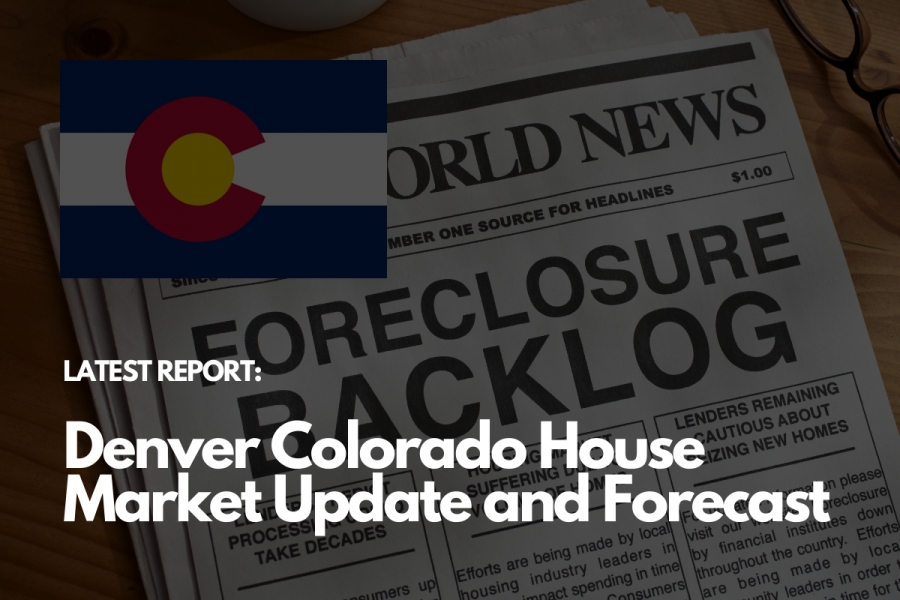A Backlog of Denver Foreclosures Will Cause A Real Estate Downturn in Colorado and Nationally. Or will it?
Unemployment is up, foreclosure rates are at 16-year lows. Is anyone else confused?
The number of processed foreclosures in Denver, Colorado has dropped by almost 90% over the last 12 months. So why are more families, in increasing numbers, seeking help to stop foreclosure? AND this is mirrored in every city in the US.
DENVER, COLORADO: Currently the rate of foreclosure in Colorado is less than 2%. This is pretty low historically.
In fact, a low foreclosure rate can be seen all across the country at the moment.
But for the moment I want to focus on Colorado.
I compared 2020 foreclosure rates in Denver (as measured by filed Notices of Election and Demand filed in Denver) to 2019 we see a 90% reduction in new foreclosures.
Foreclosure Filings in Denver Are Down Significantly Year On Year.

That is good news, right?
Not so fast. AND HERE'S WHY.
We did some research online. We found that the search term “stop foreclosure” has become increasingly popular on Google and Bing. Specifically, the question how to stop foreclosure in (city name here)? is searched 1000’s of times.
Take a look at the link above for the results.
The Number of Home-owners Seeking How to Stop Foreclosure is on the Rise.

So, we want to explain why more families are looking for help to stop foreclosure despite very low rates of foreclosures being started or completed in Denver, Colorado, and in fact a large portion of the country.
AND WHY MIGHT THIS BE A CAUSE FOR CONCERN?
Many economists are concerned that the reason for a low foreclosure rate is the various restrictions put on processing foreclosures by the government. They fear that in the medium to long term, this could cause many foreclosures hitting the markets all at once and causing an exaggerated downturn. The last time we had an exaggerated downturn due to a flood of foreclosures was the great recession.
However, let me say this. The various local, state and federal government agencies are trying to help those in need and I commend their efforts. It is easy to talk negatively about efforts yet not provide a legitimate solution myself. There will always be a healthy debate over just how much the government should be involved, right?
I put together an extensive list of useful resources for current Denver-based homes seeking foreclosure financial assistance. It would be great to hear of other useful resources in the comments below.
Now before you think I’m predicting doom and gloom in the real estate markets across the country, I am not. However, I think it is prudent to at least consider the possibility or understand how the pending foreclosures could affect our respective markets in the future.
QUICK INTERRUPTION: PLEASE SUBMIT YOUR COMMENTS ABOUT WHAT YOU SEE, HEAR AND THINK ABOUT FORECLOSURES IN YOUR MARKET BELOW – Thanks.
After we look at those numbers we will then investigate how this could affect you and the value of your house in Denver in the future.
Shall we begin?
If you are like me and have seen the foreclosure numbers lately, you might be confused.
WHY, you ask?
I am confused because the economic fundamentals suggest that foreclosure rates should be high. But they are not. In fact, foreclosure rates are at extremely low levels in Denver, in Colorado, and all across the states.
Why should the foreclosure rates be high?
COLORADO FORECLOSURE RATES:
Foreclosure rates should be high because for most of last year unemployment rates in Colorado were over 10%. In April 2020 the rate of unemployment was 12.2%. (image stop foreclosure unemployment rate).
The last time unemployment rates were this high in Colorado was during the great recession a decade ago. During this period foreclosure rates were also very high so it would be a logical conclusion to think that foreclosure rates would, at the very least, would be on the rise currently.
AND HERE IS THE CONFUSION.
The foreclosure rates are much lower. In fact, the foreclosure rates are almost 90% lower when we compared the 4th quarter of 2019 with the 4th quarter of 2020.
On the outside this is great news, right (we will get why this might not be good news later in the article).
Foreclosure rates are way down in Denver. Is it the same in other parts of the country also?
We took a look at Arizona, Kansas, California, New York, and many other states. In the end, we found these 2 press releases which seemed to sum it up best.
Both discuss national foreclosure rates being the lowest they have been in 16 years. So, it seems it's not just happening in my market but it's happening in your too.
There is an easy explanation for the low foreclosure rate you say?
There is an easy explanation. At all levels of government, there have been requests, suggestions, and laws put in place to delay the processing of foreclosures. This in response to the Global Pandemic.
Now while this is not the topic of this article it does bring to light the question of whether or not the government should try and stop foreclosures. How much should the government get involved? Should the government let cycles run their natural course?
OF COURSE, I do not want to see anyone lose their home. However, what is worse? Some foreclosures or everyone underwater on their mortgages (this is the worst-case scenario of course). AND if I were facing foreclosure, I would probably prefer to keep my house but lose value.
What about you?
Concern for the medium-term future of house prices in Denver and all cities.
It seems like a reasonable thought process that if the foreclosures are postponed a large number will, at some point, hit the market all at once. If many houses hit the market all at once at a lower price, then it seems reasonable to conclude that house prices, in general, will fall.
Second to this if the quality of houses is lower this will also have a negative effect. By quality I am referring to the latest term the media is throwing out there. ZOMBIE FORECLOSURES. These are houses that people have got behind on their mortgages, are facing foreclosure, and so they have walked away from the house leaving it vacant. As the house is not being taken care of they deteriorate. See what I am saying?
AND This problem is real. Cities like New York are creating initiatives to attack this very problem. A recently published article found Zombies homes are increasing in all but one state with the highest rates in the Northeast and Midwest.
Now people much smarter than I am are also concerned about this. Some economists believe we will see the effect in 2021 and describe that the “foreclosures wave will cause house prices to crash down in 2021” while recent proposals banning the conclusion of foreclosures (I.e. the sale of the house) until 2022 have many think 2022 and 2023 will be when they hit the market and have their impact.
In Summary.
Real estate continues to prove itself to me as an exciting industry to be working in. There are so many things at play. In my opinion, I believe that foreclosures will have a negative impact on the housing market in the medium-term future. I think that 2022 if no new laws are put in place, will see a flood of foreclosures.
How much of an impact will this have on the Denver housing market?
ASK ME IN 2023 – Hindsight is 2020, right?
I would love to hear your thoughts.
How much of an impact will foreclosures have on your market in the future?
Do you get contacted more regularly about how to stop foreclosures?









